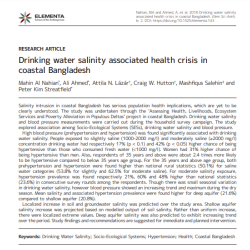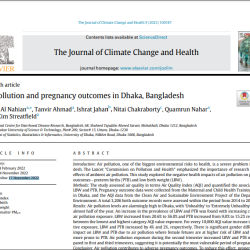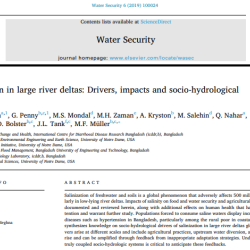Mohammed M. Rahman, Sate Ahmad, Ayesha S. Mahmud, Md. Hassan-uz-Zaman, Mahin A. Nahian, Ali Ahmed, Quamrun Nahar, Peter K. Streatfield
https://doi.org/10.1002/wcc.601 | 27 th June, 2019
Mohammed M. Rahman, Sate Ahmad, Ayesha S. Mahmud, Md. Hassan-uz-Zaman, Mahin A. Nahian, Ali Ahmed, Quamrun Nahar, Peter K. Streatfield
https://doi.org/10.1002/wcc.601 | 27 th June, 2019
Climate change affects almost all aspects of human life, including health. This is particularly true in densely populated and low lying deltas such as Bangladesh. However, the climate-health nexus is a relatively poorly explored domain of research, which is a cause for concern given the country's intrinsic vulnerability to climatic impacts. The impact of climate change on human health and well-being can be manifested through different pathways and can be categorized as being direct or indirect, mediated through complex biophysical and social dynamics. The direct effects of climate change that have been observed in Bangladesh include morbidity and mortality due to heat stress, cyclones, floods, droughts and other weather extremes at different spatio-temporal scales. The indirect effects adopt more complex routes which includes, threatening food and water security due to salinity intrusion, and spread of infectious diseases due to changes in vector and pathogen ecology. Social dynamics in Bangladesh, such as those related to gender roles, poverty and power relations, also influence how the effects of climate change are experienced by different segments of the society. The Government of Bangladesh has a number of measures already in place, efforts that have been complemented by local interventions. Evidence to take robust health policy decisions related to climate change is limited and scattered, while there is a lack of multidisciplinary research efforts. Considering these limitations, generating and summarizing scientific evidence is vital for informing a resilient health system against future public health concerns in climate vulnerable countries such as Bangladesh and in other low-income regions.

ABSTRACT Salinity intrusion in coastal Bangladesh has serious population health implications, which are yet to be clearly understood. The study was undertaken through

lorem ipsum lorem ipsum lorem ipsum lorem ipsum lorem ipsum lorem ipsum lorem ipsum lorem ipsum lorem ipsum lorem ipsum lorem ipsum lorem ipsum

Abstract Bangladesh, one of the most disaster-prone countries in the world is also severely exposed to climate change (CC) impacts with a multitude of health comple

Abstract Salinization of freshwater and soils is a global phenomenon that adversely affects 500 million people, particularly in low-lying riv

ABSTRACT Salinity intrusion in coastal Bangladesh has serious population health implications, which are yet to be clearly understood. The study was undertaken through
This website was produced with the support of the United States Agency for International Development (USAID) under the terms of USAID's Research for Decision Makers (RDM) Activity cooperative agreement no. AID-388-A-17-00006
Views expressed herein do not necessarily reflect the views of the U.S. Government or USAID. icddr,b is also grateful to the Governments of Bangladesh, Canada, Sweden and the UK for providing unrestricted/institutional support
68, Shaheed Tajuddin Ahmed Sarani Mohakhali, Dhaka 1212, Bangladesh
icddr,b is located at the Mohakhali area in Dhaka, just ask your driver for the "Cholera Hospital"
